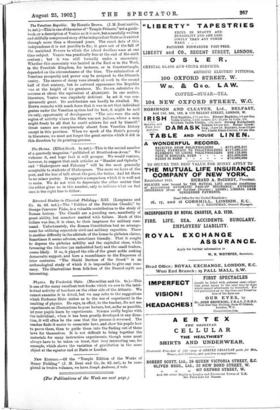The Venetian Republic. By Horatio Brown. (J. Y. Dent and
Co.
net.)—This is one of the series of " Temple Primers," not a guide- book, or a description of Venice as it is now, but a carefully written and skilfully compressed story of the independent State as it existed through more than a thousand years. The exact date of this independence it is not possible to fix ; it grew out of the fall of the mainland Powers to which the island dwellers were at one time subject. Venice was practically free at the end of the sixth century ; but it was still formally under a suzerainty. Whether this suzerainty was located in the East or in the West, in the Frankish Kingdom, for instance, or in Constantinople, depended on the circumstances of the time. The culmination of Venetian prosperity and power may be assigned to the fifteenth centry. The causes of decay were already at work in the second half of that century, but to outward appearance the Republic was at the height of its greatness. Mr. Brown calculates its revenue at about the equivalent of £3,000,000. In one matter, literature, Venice was singularly deficient. In art it was con- spicuously great. lts architecture can hardly be rivalled. Mr. Brown remarks with much force that it was in art that individual genius under the Venetian system had its best, it might be said its only, opportunity of development. "The arts were the only region of activity where the State was not jealous, where a man might freely be all that he could achieve for and by himself." Great names are conspicuously absent from Venetian history except in this province. When we speak of the State's poverty in literature, we must not forget the great service which it did in this direction by its printing-presses.






































 Previous page
Previous page